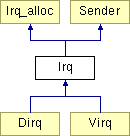
#include <irq.h>
Inheritance diagram for Irq:

Public Member Functions | |
| Irq (unsigned irqnum) | |
| Constructor. | |
| int | queued () |
| virtual void | ipc_receiver_ready () |
| Sender-activation function called when receiver gets ready. | |
| void | maybe_acknowledge () |
| If this is a kernel-acknowledged IRQ, disable and acknowledge the IRQ with the PIC. | |
| void | maybe_enable () |
| If this is a kernel-acknowledged IRQ, enable the IRQ with the PIC. | |
Static Public Member Functions | |
| static Irq * | lookup (unsigned irq) |
Protected Attributes | |
| int | _queued |
Private Member Functions | |
| Irq () | |
| Irq (Irq &) | |
| int | consume () |
| Consume one interrupt. | |
This class encapsulates handware IRQs. Also, it provides a registry that ensures that only one receiver can sign up to receive interrupt IPC messages.
|
|
|
|
|
|
|
|
Constructor.
|
|
|
Consume one interrupt.
|
|
|
Sender-activation function called when receiver gets ready. Irq::hit() actually ensures that this method is always called when an interrupt occurs, even when the receiver was already waiting. Implements Sender. |
|
|
Reimplemented from Irq_alloc. |
|
|
If this is a kernel-acknowledged IRQ, disable and acknowledge the IRQ with the PIC. XXX We assume here that we have the kernel lock. |
|
|
If this is a kernel-acknowledged IRQ, enable the IRQ with the PIC.
|
|
|
|
|
|
|
 1.4.2
1.4.2